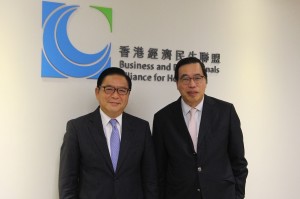
Media reports have been abuzz with speculation that Chief Executive Leung Chun-ying is planning to announce in his upcoming Policy Address the abolition of the offsetting mechanism under the Mandatory Provident Fund (MPF). Under this mechanism, employers can use their portion of MPF contributions to offset severance or long-service payments due to departing workers. In connection with such developments, the Business and Professionals Alliance for Hong Kong (BPA) held a number of meetings with various representatives from the seven major chambers, small and medium enterprise (SMEs) groups, the tourism industry, trade and professional bodies, as well as independent legislators over the course of the previous week. Arising from such discussions, it was unanimously agreed that the business community should adopt the uniform stance of objecting strenuously to the scrapping of the MPF offsetting mechanism as this would add to the cost of doing business in an already difficult operating environment. It was also agreed to establish a platform for the BPA to collaborate with business and professionals to air concerns in a coordinated manner.
Mr Andrew Leung Kwan-yuen, BPA Chairman, said that the Government had permitted the inclusion of an offsetting mechanism when lobbying the business and industrial sectors for support to the introduction of MPF. He also called for a business impact study to be carried out, particularly for SMEs, as well as thorough discussion in the Labour Advisory Board before the introduction of any changes to the current regime.

Mr Jeffrey Lam Kin-fung, BPA Vice Chairman, estimated that salaries accounted for about half of the total operating costs in service industries. Overheads would therefore rise by at least 2.5% if the offsetting mechanism was eliminated. Given the already challenging business environment, it would be extremely difficult for SMEs to make enough to recover the additional 2.5% in costs that would be imposed should abolition become a reality. He also pointed out that should the Government decide to assume the costs associated with abolition, this would eventually be passed on to taxpayers as “there was no such thing as a free lunch”.
Mr Jeffrey Lam emphasised that it was a fallacy to presume that the business sector should take on the lion’s share of footing the bill for social costs. It would also be irresponsible to defer issues related to an aging population to future generations, which would likely have problems of their own.
Mr Andrew Leung added, “I really don’t think the Government should put forward so many controversial issues as this will only polarise the business and labour sectors, especially since the BPA and the Hong Kong Federation of Trade Unions (FTU) are members of the pro-establishment camp.”
As the representative of the business and professionals sectors, the BPA will work closely with chambers and representatives from various industries in the collection of data and information. The Hong Kong Cultural Development Research Institute has been invited to analyse the impact of the abolition of the offsetting mechanism on enterprises across different sizes and industries, as well as the overall Hong Kong economy. Thereafter, the BPA will present the findings to the Government while continuing to work hand-in-hand with the business community and politicians to fight against the MPF rule change.
The Liberal Party had also been invited but did not send any representatives. Mr Andrew Leung said he respected the Liberal Party’s decision and maintained that the invitation was opened to any parties and groups that were opposed to the abolition of the offsetting mechanism.

 Follow
Follow